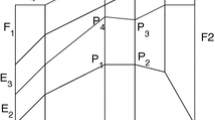Abstract
Currently used finite volume methods are essentially low order methods. In this paper, we present a systematic way to derive higher order finite volume schemes from higher order mixed finite element methods. Mostly for convenience but sometimes from necessity, our procedure starts from the hybridization of the mixed method. It then approximates the inner product of vector functions by an appropriate, critical quadrature rule; this allows the elimination of the flux and Lagrange multiplier parameters so as to obtain equations in the scalar variable, which will define the finite volume method. Following this derivation with different mixed finite element spaces leads to a variety of finite volume schemes. In particular, we restrict ourselves to finite volume methods posed over rectangular partitions and begin by studying an efficient second-order finite volume method based on the Brezzi–Douglas–Fortin–Marini space of index two. Then, we present a general global analysis of the difference between the solution of the underlying mixed finite element method and its related finite volume method. Then, we derive finite volume methods of all orders from the Raviart–Thomas two-dimensional rectangular elements; we also find finite volume methods to associate with BDFM 2 three-dimensional rectangles. In each case, we obtain optimal error estimates for both the scalar variable and the recovered flux.
Similar content being viewed by others
References
T. Arbogast, C.N. Dawson, P.T. Keenan, M.F. Wheeler and I. Yotov, Enhanced cell-centered finite differences for elliptic equations on general geometry, SIAM J. Numer. Anal. 19 (1998) 404–425.
T. Arbogast, M.F. Wheeler and I. Yotov, Mixed finite elements for elliptic problems with tensor coef-ficients as cell-centered finite differences, SIAM J. Numer. Anal. 34 (1997) 828–852.
D.N. Arnold and F. Brezzi, Mixed and nonconforming finite element methods: implementation, postprocessing and error estimates, RAIRO Modél. Math. Anal. Numér. 19 (1985) 7–32.
B.R. Baliga and S.V. Patankar, A new finite-element formulation for convection–diffusion problems, Numer. Heat Transfer 3 (1980) 393–409.
R.E. Bank and D.J. Rose, Some error estimates for the box method, SIAM J. Numer. Anal. 24 (1987) 777–787.
J. Baranger, J.F. Maitre and F. Oudin, Connection between finite volume and mixed finite element methods, Modél. Math. Anal. Numér. 30(4) (1996) 445–465.
F. Brezzi, J. Douglas, Jr., R. Durán and M. Fortin, Mixed finite elements for second order elliptic problems in three variables, Numer. Math. 51 (1987) 237–250.
F. Brezzi, J. Douglas, Jr., M. Fortin and L.D. Marini, Efficient rectangular mixed finite elements in two and three space variables, RAIRO Anal. Numér. 21 (1987) 581–604.
F. Brezzi, J. Douglas, Jr. and L.D. Marini, Two families of mixed finite elements for second order elliptic problems, Numer. Math. 47 (1985) 217–235.
F. Brezzi and M. Fortin, Mixed and Hybrid Finite Element Methods (Springer, New York, 1991).
Z. Cai, On the finite volume element method, Numer. Math. 58 (1991) 713–735.
Z. Cai, J. Mandel and S. McCormick, he finite volume element method for diffusion equations on general triangulations, SIAM J. Numer. Anal. 28(2) (1991) 392–402.
P.G. Ciarlet, The Finite Element Method for Elliptic Problems (North-Holland, Amsterdam, 1978).
J. Douglas, Jr. and J.E. Roberts, Global estimates for mixed methods for second order elliptic equations, Math. Comp. 44 (1985) 39–52.
J. Douglas, Jr. and J. Wang, A new family of mixed finite element spaces over rectangles, Mat. Apl. Comput. 12 (1993) 183–197.
R.S. Falk and J.E. Osborn, Error estimates for mixed methods, RAIRO Anal. Numér. 14 (1980) 309–324.
B.X. Fraeijs de Veubeke, Stress function approach, in: Internat.Congress on the Finite Element Method in Structural Mechanics, Bournemouth, 1975.
B. Heinrich, Finite Difference Methods on Irregular Networks (Birkhäuser, Basel 1987).
J.C. Nedelec, Mixed finite elements in R3, Numer. Math. 35 (1980) 315–341.
P.A. Raviart and J.M. Thomas, A mixed finite element method for 2nd order elliptic problems, in: Mathematical Aspects of Finite Element Methods, Lecture Notes in Mathematics, Vol. 606, eds. I. Galligani and E. Magenes (Springer, New York, 1977) pp. 292–315.
T.F. Russell and M.F. Wheeler, Finite element and finite difference methods for continuous flows in porous media, in: The Mathematics of Reservoir Simulation, ed. R.E. Ewing (SIAM, Philadelphia, PA, 1983).
Author information
Authors and Affiliations
Rights and permissions
About this article
Cite this article
Cai, Douglas & Park Development and Analysis of Higher Order Finite Volume Methods over Rectangles for Elliptic Equations. Advances in Computational Mathematics 19, 3–33 (2003). https://doi.org/10.1023/A:1022841012296
Issue Date:
DOI: https://doi.org/10.1023/A:1022841012296



